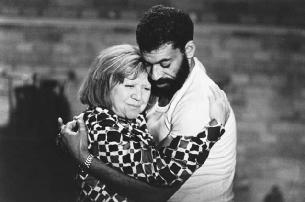HINTS OF ALTERITY
Raben's unwillingness to interiorize musical signs, or for that matter to associate them with any direct utopianism, is evident in his score of Fassbinder's Ali: Fear Eats the Soul, in which Emmi (Brigitte Mira), a middleaged widow, becomes involved with Ali (El Hedi ben Salem), a Moroccan worker much younger than she. The North African music that appears intermittently in its spartan score reasserts the rigid racial divides of the film's diegesis. The music offers no escape to Ali and his friends, who are

Fragile utopias: Emmi and Ali in Fassbinder's Ali: Fear Eats the Soul
Yet for Emmi the music extends the possibility of a refuge. Fassbinder has long been noted for his interest in disenfranchised people. For a cleaning woman whose labor is ill-paid, and for whom, as a middle-aged woman, her sexual worth plummets, the North African music might offer a momentary escape from western norms and pressures. This is not to say that the music functions as pure metonym for Ali's Arab culture or that Emmi's is a simple, open celebration of it. Far from it. Their initial meeting, for instance, is at the grimly named Asphalt Pub, where they dance to one of the jukebox tunes. The song is not Arab but an old, scratchy popular German tune (later referred to as "that gypsy record"), significantly the only non-Arab music heard in the bar—or most of the film, for that matter. In typical melodramatic fashion, the scene will be restaged at the end of the film as Emmi and Ali try to regain the intimacy and trust of the earlier days.
During their dance Ali comments, "German master, Arab dog." Emmi displays no such mastery and dramatizes the fiction of that kind of identifactory
Nor does music come rushing in to redress such deficiencies, as it would in a more conventional melodrama. The score offers little extravagance or even sustenance to its characters. Take, for instance, the nondiegetic music that appears briefly on three occasions. Initially we hear a brief, aimless melody when Ali and Emmi talk in bed the night they meet, then as Ali goes toward the bar after he's walked out on her, and later at the end of the film as the image fades to black. Thoroughly conventional in style, the short, unmotivated phrase appears to be Fassbinder/Raben's wink at music's typical emotional function in melodrama. Similarly, when Emmi announces, "Now I'll play our record," when putting "the gypsy music" on the jukebox at their engagement celebration, it is difficult to hear anything but hollow promises and doomed identification (by this point, the song's initial promise has been perforated like the ulcers that plague Ali).